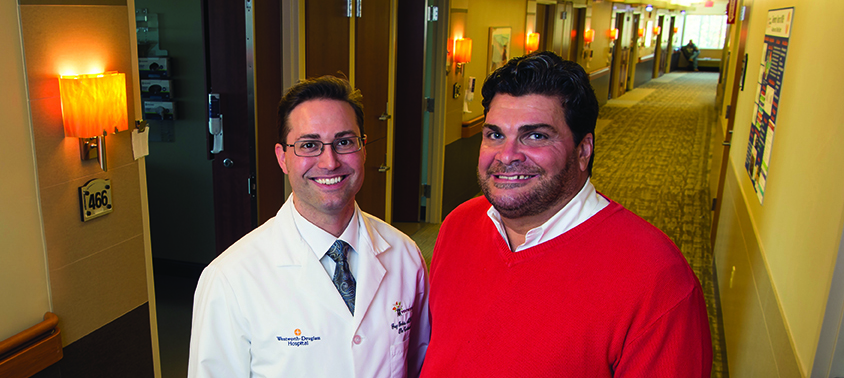01/02/2017
Michael's Heart Attack - Not Just Chest Pain
When Michael Loos, of Eliot, Maine, arrived at Wentworth-Douglass Hospital’s Emergency Department in September, he never expected to hear the words "heart attack."
Michael has struggled with several health problems over the years, including kidney stones and Type 2 Diabetes. “I've been bombarded medically by many things. I feel like a superhero deflecting bullets, one after another," he jokes. "I try to stay positive and move forward day after day. Wentworth-Douglass has been a wonderful hospital to me.”
Throughout this past summer, Michael felt sluggish, like he'd walked a marathon by the end of each day. He shrugged it off assuming the heat was getting to him. Then, one morning in September, he woke up with terrible nausea.
"I was hot, cold, clammy and sweaty. I thought I had the flu, so I made an appointment with my primary care provider,” he says.

After examining him, Dr. Virginia Hassett, of Wentworth Health Partners Strafford Medical Associates, directed Michael to head straight to the Emergency Department – and not a moment too soon. Within minutes of his arrival Michael was hooked up to an electrocardiogram (EKG) to test the electrical activity in his heart. The result – Michael was having a massive heart attack.
“I remember hearing them call for a STEMI Team Activation on the overhead and seeing Dr. [Greg] Imbrie coming around the corner and saying to me very clearly, ‘You are having a heart attack,’” says Loos. “Everyone was moving so quickly. They got me prepared and moved me to the Cardiac Cath Lab. I was overwhelmed and emotional, but the staff was so reassuring and that calmed me right down.”
Heart Attack Treatment & Recovery
Wentworth-Douglass’s Cardiac Catheterization Lab offers 24/7 access to state-of-the art treatments for heart attacks. (Read more on page 1.) Less than 30 minutes after he first arrived at the hospital, Michael was undergoing a catheterization procedure to evaluate his heart’s arteries for narrowing and blockages. Dr. Imbrie discovered a completely occluded right coronary artery, removed the clot and used a series of stents to restore blood flow with “a beautiful result.”
Michael was having an inferior myocardial infarction. Nausea is a common symptom for this particular type of heart attack, especially for people with diabetes. “Nausea should not be thought of as a risk free symptom in diabetics, especially if it’s persistent, severe nausea,” says Dr. Imbrie. “Michael did the right thing by coming in when he did.”
After the immediate repairs were made, Michael’s path to recovery began day one as an inpatient. “The inpatient team matters as much as me fixing the artery, doing diabetes care, medication management and more. It’s all so important to helping patients make a complete and healthy recovery,” says Dr. Imbrie. “Our entire team has done a fantastic job with the degree of care Michael needs, and he’s doing brilliantly.”
Since September, Michael has received outpatient care at Wentworth Health Partners The Cardiovascular Group. He’s experienced pericarditis, heart inflammation that often follows a serious heart attack. Once the inflammation resolves, Michael will participate in the Cardiac Rehab Program, which studies have shown greatly improves patient outcomes and is recommended for all stent patients.
“I have complete confidence in Dr. Imbrie and complete confidence in myself to get through this,” says Michael. “I will come back from this – and the assistance of Dr. Imbrie and his team make the journey better.”
Heart Attack - Not Just Chest Pain
It’s very common for people to shrug off heart attack symptoms instead of seeking treatment. Women and people with diabetes are especially likely to experience atypical symptoms instead of crushing chest pain.
Don't Ignore These Symptoms If They Are Persistent:
- Nausea
- Shortness of breath
- Sweating
- Arm, shoulder and jaw pain
- Heart palpitations
For more information about Wentworth-Douglass Hospital’s Cardiovascular Care Center, please call (603) 740-2121.